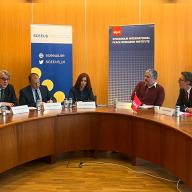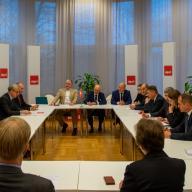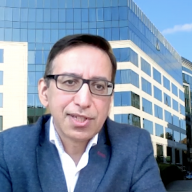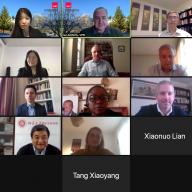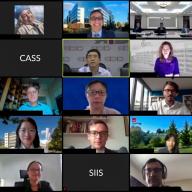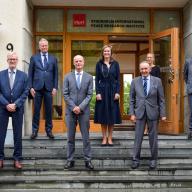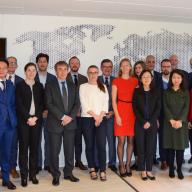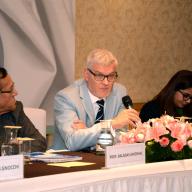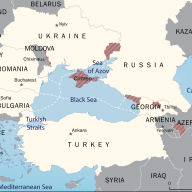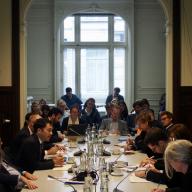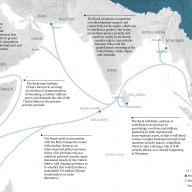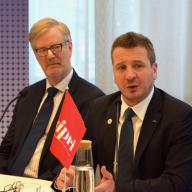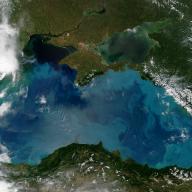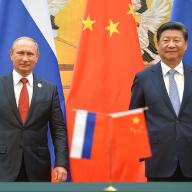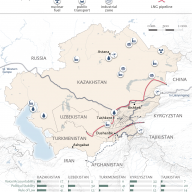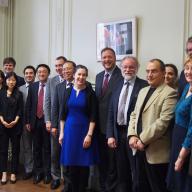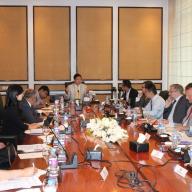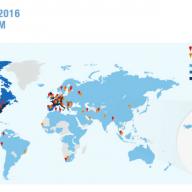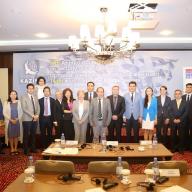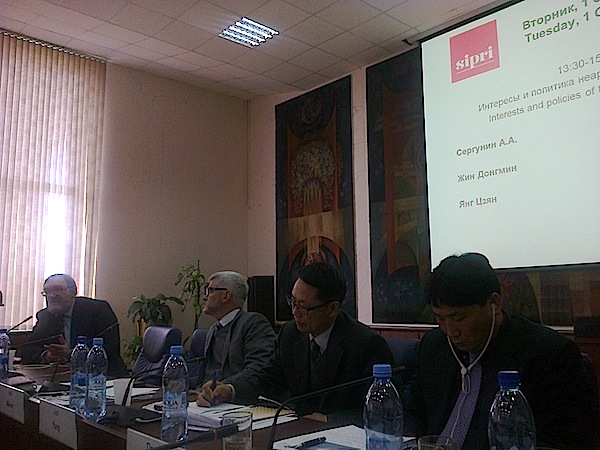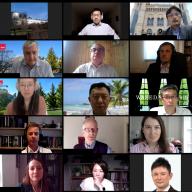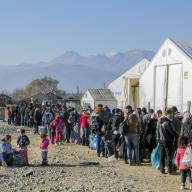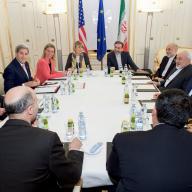On 21 October, the Stockholm International Peace Research Institute (SIPRI) and the French Embassy in Sweden co-hosted a roundtable discussion on the evolving security dynamics in the Arctic. Once considered insulated from geopolitical competition, the region has become increasingly central to global and transatlantic security concerns.
Related news: Europe
SIPRI hosts discussion on Nordic–Japanese cooperation
On 6–7 March, SIPRI hosted a symposium to explore different perspectives on and opportunities for strengthening security cooperation between the Nordic countries and Japan.
SIPRI hosts international conference on European security and deterrence
On 22–23 October 2024, SIPRI hosted the eighth edition of the Stockholm Security Conference. This year’s conference, titled ‘Deterrence. Securing Europe, Managing the Dangers’, aimed to help decision makers navigate current debates on deterrence and defence.
SIPRI co-hosts conversation on Europe’s evolving security landscape
On 3 October, SIPRI and the Embassy of France in Stockholm hosted an event under the title ‘French Grand Strategy: The Military Pivot to Europe’.
SIPRI event takes stock of Europe’s role in fostering peace and stability
On 7–8 December, SIPRI organized a brainstorming workshop entitled ‘Fostering Peace and Stability: Rethinking the European Model’.
SIPRI and SCEEUS host event on security governance after Russia’s war against Ukraine
On 22 February, SIPRI and Stockholm Centre for Eastern European Studies (SCEEUS) hosted the roundtable ‘Security Governance after Russia’s War against Ukraine’. The discussion centered on different scenarios for Ukraine and necessary measures for its future security as part of Europe and the West.
SIPRI hosts the Minister of Defence of Ukraine
On 15 December 2021, SIPRI hosted Ukrainian Minister of Defence Oleksii Reznikov, as part of his official visit to Sweden.
SIPRI hosts webinar on perspectives on China–EU relations and connectivity
On 18 May, SIPRI hosted a webinar in connection with the launch of the SIPRI Policy Paper ‘China–EU Connectivity in an Era of Geopolitical Competition’.
New video series on EU–China relations and connectivity
SIPRI is pleased to launch a new video series on the topic of European Union (EU)–China relations and the role of connectivity, featuring interviews with European and Chinese experts.
SIPRI hosts event on harmonizing EU–China approaches to financing green development
On 12 November, SIPRI hosted a virtual dialogue on the theme of ‘Towards Harmonized Approaches to Financing Green Development’.
SIPRI and CIIS co-host webinar series on EU–China relations and connectivity
On 2–3 September, SIPRI and the China Institute of International Studies (CIIS) co-hosted a two-day webinar series on ‘EU–China Relations in an Era of Connectivity’.
SIPRI hosts the Minister of Foreign Affairs of The Netherlands
On 9 September 2020, SIPRI proudly hosted a visit by His Excellency Stef Blok, Minister for Foreign Affairs of The Netherlands. The event was part of the minister’s official visit to Sweden.
SIPRI hosts workshop on 'China–EU Relations in an Era of Connectivity'
On 17–18 October, SIPRI held the first of two workshops on ‘China–European Union (EU) Relations in an Era of Connectivity’.
SIPRI co-hosts workshop on maritime security in the Indian Ocean region
On 7–8 February, SIPRI, in cooperation with India’s National Maritime Foundation and the Delegation of the European Union (EU) to India, organized a workshop in Delhi entitled ‘Securing the Maritime Commons: India, the European Union and Indian Ocean Maritime Security’.
SIPRI informs on Black Sea security
SIPRI has expanded its research on security issues in the Black Sea region by launching a new series of publications. Each publication analyses a different issue or provides context to a current security dilemma in the region.
SIPRI launches new report on nuclear security at two events in Washington
On the occasion of the launch of a new SIPRI report, Nuclear Security in the Black Sea Region: Contested Spaces, National Capacities and Multinational Potential, SIPRI co-hosted two events in Washington, DC, in December.
Report on security implications of China’s Maritime Silk Road launched in Beijing, Berlin, Brussels and Stockholm
SIPRI, in cooperation with the FES, presented the findings of its new report on the sea-based component of the Belt and Road Initiative (BRI) in launch events for key stakeholders throughout Asia and Europe.
New report on the 21st Century Maritime Silk Road
SIPRI is pleased to announce the launch of a new report on the security implications of China’s 21st Century Maritime Silk Road (the Road).The report examines the impact of the two most strategic maritime spaces that the initiative traverses: the South China Sea and the Indian Ocean Region. It assesses the implications of the project for European Union (EU) foreign and security interests, but should also be relevant to all stakeholders of the Road.
SIPRI co-hosts workshop in Myanmar on regional security implications of the 21st Century Maritime Silk Road
On 22-23 February, SIPRI and the Friedrich-Ebert-Stiftung (FES) hosted the second of three workshops for a joint project that examines the security implications of the 21st Century Maritime Silk Road (Road) in Yangon, Myanmar.
SIPRI hosts Iceland’s Foreign Minister
As part of his official visit to Sweden, SIPRI hosted His Excellency, Gudlaugur Thór Thórdarson, Minister for Foreign Affairs of Iceland, for an expert roundtable discussion.
New SIPRI research on the 21st Century Maritime Silk Road
SIPRI and the Friedrich-Ebert-Stiftung (FES) will continue their cooperation on researching China’s Belt and Road Initiative (BRI) from a security perspective.
EU Non-proliferation Consortium final report for 2014–17 released
The EU Non-proliferation Consortium's final report is now available. The report summarizes the key developments in non-proliferation in 2014–17, with a focus on an analysis of the EU’s main achievements, and the major obstacles and future challenges it faces.
Nuclear forensics as nuclear material analysis for security purposes
New publication from the EU Non-Proliferation Consortium on the potential benefits of expanding the scope of nuclear forensics as a discipline and the European contribution to this.
SIPRI wins grant for innovative research on nuclear security in the Black Sea region
Following a competitive process, SIPRI is pleased to announce that it has been awarded a grant from Carnegie Corporation of New York and MacArthur Foundation to support new approaches for nuclear security.
SIPRI publishes Policy Paper on emerging Chinese–Russian cooperation in the Arctic
SIPRI is pleased to announce its latest Policy Paper looking at Chinese–Russian cooperation in the Arctic.
Phosphate fertilizers as a proliferation-relevant source of uranium
New publication from the EU Non-Proliferation Consortium on the how past events and current international trade practices clearly demonstrate that better-informed export controls and end-user processes are required.
SIPRI’s Silk Road Economic Belt report presented in Tbilisi
SIPRI researchers Jiayi Zhou and Richard Ghiasy presented the SIPRI – Friedrich-Ebert-Stiftung (FES) report ‘The Silk Road Economic Belt: Security Implications and EU-China Cooperation Prospects’ in Tbilisi, Georgia.
The European Union and weapons of mass destruction: A follow-on to the global strategy?
New publication from the EU Non-Proliferation Consortium on why the EU needs to undertake a new and dedicated effort to deal with WMD-related problems
The USA–Russia relationship and the Arctic
SIPRI Researcher Ekaterina Klimenko participated in a panel discussion on the upcoming Finnish Arctic Council chairmanship.
China–Russia relations and regional dynamics: From pivots to peripheral diplomacy
SIPRI is pleased to announce the publication of an edited volume of essays, entitled ‘China–Russia Relations and Regional Dynamics: From Pivots to Peripheral Diplomacy’, based on participant contributions to SIPRI’s expert workshop in January 2017 on the theme of Russia-China rapprochement.
Is three-dimensional (3D) printing a nuclear proliferation tool?
New publication from the EU Non-Proliferation Consortium on the technical limitations of 3D printing technology.
The Silk Road Economic Belt: security implications and EU–China cooperation prospects
SIPRI is pleased to announce the publication of the report 'The Silk Road Economic Belt: Considering Security Implications and EU–China Cooperation Prospects'.
SIPRI hosts workshop on the Silk Road Economic Belt, the EU and Central and South Asia
SIPRI co-hosted the final of a series of five regional workshops for the Silk Road Economic Belt - Seeking Common Security Interests between the EU and China project in Brussels, Belgium.
Interviews with SIPRI's Governing Board: Is there a new cold war?
At a time of increasingly tense relations between Russia and the West, SIPRI interviewed members of its Governing Board to reflect on the question: Is there a new cold war?
SIPRI co-hosts workshop on Russian interests in China's Silk Road initiative
SIPRI co-hosted a workshop on the compatibility of the Silk Road Economic Belt with Russian national security interests.
SIPRI co-hosts workshop on the China-Pakistan Economic Corridor
SIPRI researchers Richard Ghiasy and Jiayi Zhou co-hosted the third of a series of five workshops for the Silk Road Economic Belt—Seeking Common Security Interests between the EU and China project.
SIPRI contributes to 2016 Security Jam report
The report from the 2016 Security Jam, where SIPRI hosted a session on future strategies in policing, is released today.
SIPRI researchers participate in two events on China and Central Asia
SIPRI researchers Dr Lora Saalman, Richard Ghiasy and Jiayi Zhou participated in two events on China and Central Asia held in Astana, Kazakhstan.
SIPRI participates in European youth project
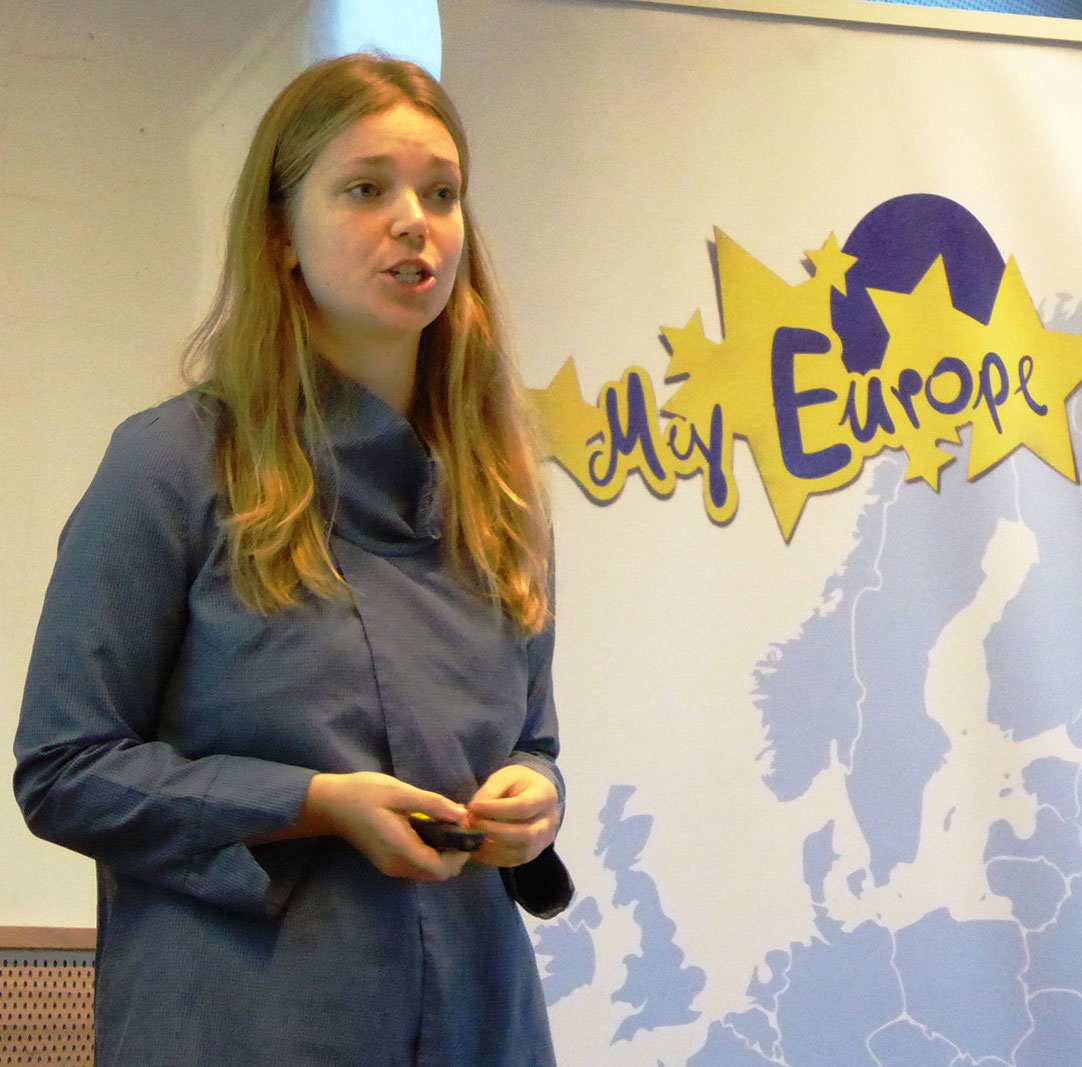 In 2014 SIPRI's European Security Programme participated in a number of initiatives that solicited the views of teenagers on the future of Europe. One of these initiatives was My Europe, which brought together students, politicians, business leaders, academics and journalists in workshops all over Europe.
In 2014 SIPRI's European Security Programme participated in a number of initiatives that solicited the views of teenagers on the future of Europe. One of these initiatives was My Europe, which brought together students, politicians, business leaders, academics and journalists in workshops all over Europe.
SIPRI to participate in next stage of Arctic research project
SIPRI holds Arctic workshop in Moscow
SIPRI co-organizes Arctic conference in Poland
On 23–24 November SIPRI, together with the University of Lower Silesia (Wrocław) and the Marie Curie Sklodowska University (Lublin), organized a conference entitled ‘The Arctic in the First Decade of the 21st Century: Between Competition and Cooperation’.
The Canadian Embassy in Poland provided partial funding for the event.
SIPRI researchers Kristofer Bergh and Ekaterina Klimenko presented their research at the conference, which also featured a range of speakers on Arctic issues.
China defines itself as a ‘near-arctic state’, says SIPRI
Increased military capabilities in the Arctic reflect border demarcations, says SIPRI
Resurgent nationalism and populism: How will Japan and Europe chart a way forward?
With the growth of nationalism and populism, are there areas in which Europe and Japan can benefit from expanded collaboration?
Syria and Global Order: A European Perspective
This panel discussion assessed how the Syrian conflict has reshaped the strategic relationships in the Middle East, both at the global level and between key regional actors.
The Silk Road Economic Belt: Security implications and EU–China cooperation prospects
To launch the new report on the Silk Road Economic Belt, SIPRI Researchers in the China and Global Security Programme will participate in a discussion event in Stockholm.
The Central Asian–European relationship at a crossroads?
Central Asia has begun to shift its 'multipolar’ foreign and security policies. How can the EU best build its relationship with the states and societies of Central Asia as the region transforms?
SIPRI webinar series: The Strategic Triangle in the Arctic
SIPRI proudly organized a series of webinars to create a platform for experts from China, Japan, the Nordic countries, Russia and the USA and to explore the implications of growing Chinese–Russian–US strategic competition for Nordic and North East Asian states.
Insecurity and the refugee ‘crisis’: Whose crisis? Whose security?
What is the impact in Europe of the insecurity and danger that drives people from their homelands? And what are Europe's responsibilities?
Security and economy on the Belt and Road
The roundtable discussion and report release focus on security implications of China's Belt and Road Initiative.
Nuclear multilateralism and Iran: What lessons can be drawn for EU policymakers?
To launch her new book, SIPRI Distinguished Associate Fellow Dr Tarja Cronberg will participate in an event about nuclear multilateralism and Iran.






